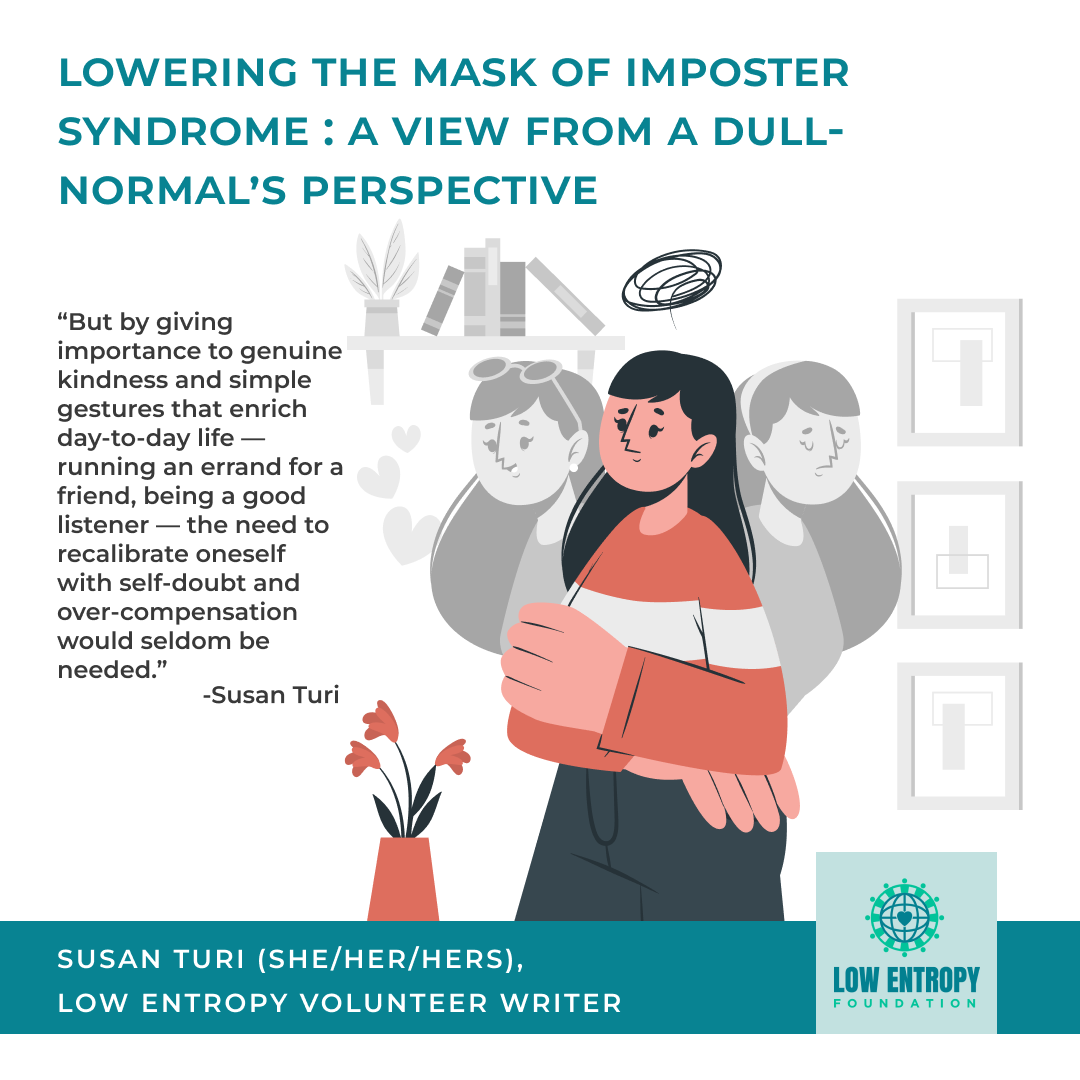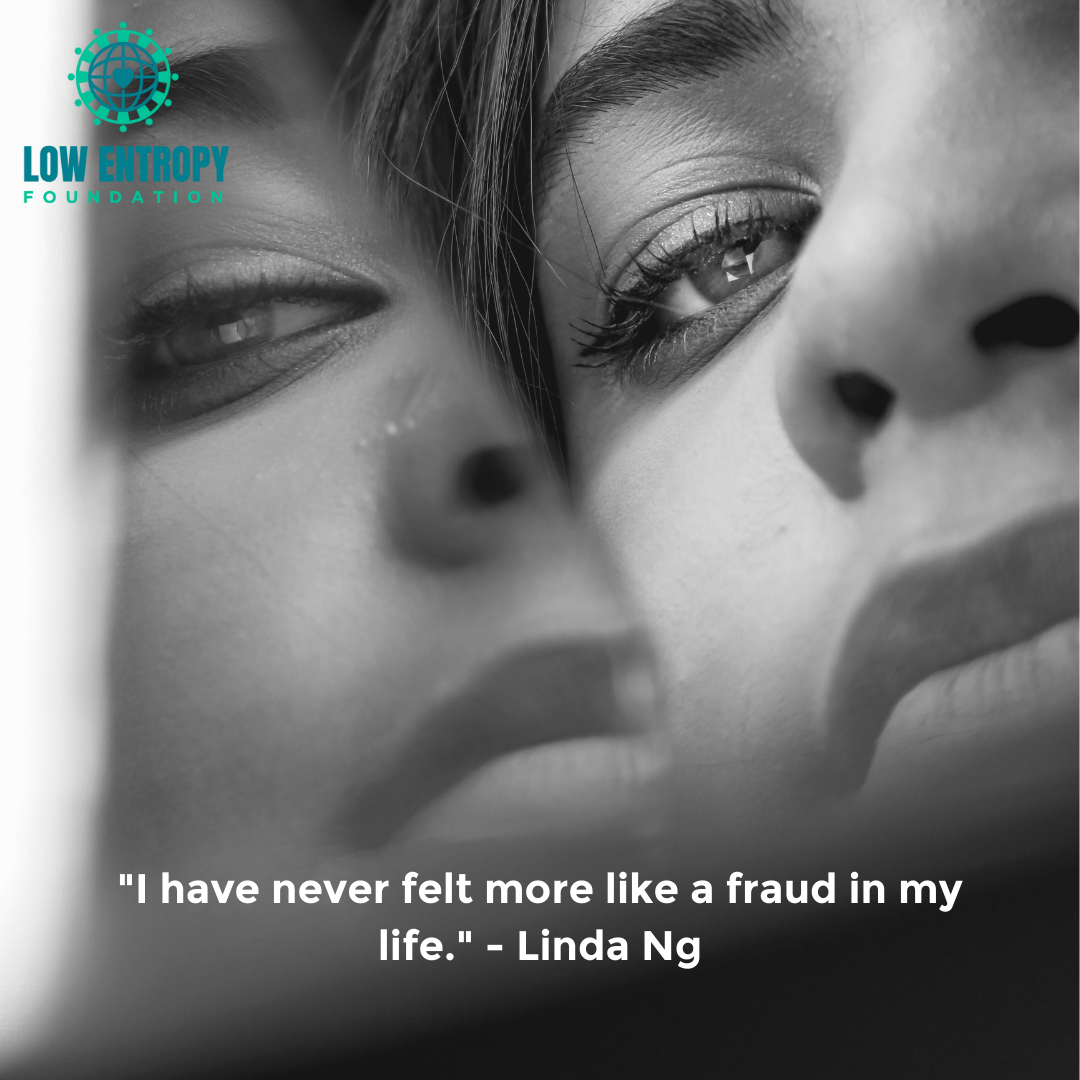Lowering the Mask of Imposter Syndrome : A View from a Dull-Normal’s Perspective
August 4, 2023

Susan Turi (she/her/hers), Low Entropy Volunteer Writer
A recent quote grabbed my attention: “Lady Gaga confesses to having imposter syndrome.”
I’d heard of imposter syndrome but never thought to look it up. I thought I knew what it meant already: simply faking who you are to get ahead in society. The classic image of a tight-lipped ventriloquist throwing their voice from behind a grinning marionette is what I had in mind. But Lady Gaga’s comment piqued my curiosity:
“I still sometimes feel like a loser kid in high school and I just have to pick myself up and tell myself that I’m a superstar every morning so that I can get through this day and be for my fans what they need for me to be.”
I needed to learn precisely what imposter syndrome meant as my ventriloquist analogy, although partially accurate, did not entirely explain the last part of Gaga’s statement which revealed her humility.
I went in search of answers and found out that many successful people like the CEO of Facebook, Sheryl Sandburg, and celebrities like Lady Gaga and Nathalie Portman, are regularly plagued with self-doubt about their success – specifically a fear that they may have faked their way up the ladder.
As I inhabit the world of the non-celebrity and have never sought to be one, I would personally never experience this syndrome yet, like everyone else, I have my fair share of insecurities. But is this the same thing? Is it just a case of excessive self-doubt proportional to a person’s success? The last part of Lady Gaga’s comment, “[…] and be for my fans what they need for me to be,” struck a chord. Gaga sees herself as filling a void for her fans by being someone or something she isn’t.
The average person goes about their everyday life doing their best to make ends meet, hoping for small successes – like balancing a monthly budget, paying off a credit card debt, or earning that degree for a better job opportunity. These are honorable, hard-earned rewards for effort. But then there are people who, because of luck, drive, talent, privilege or a cunning entourage, are given an express pass in a society built on material enrichment and status. Even though there have been many movies made and books written about the price that must be paid for success, wealth or stardom, the classic film by Orson Wells, Citizen Kane being one of them, the pressure to be seen and admired as a winner in society continues unchallenged.
In Citizen Kane, the principal character, Charles Foster Kane, a wealthy newspaper tycoon, pushes his wife, Susan, to become a successful opera singer, even though she is a mediocre singer without ambition. He feels he has to do this for many complex reasons: to justify his interest in her or, to match his status in his choice of partner. He cannot value her for her simplicity. Having been adopted into privilege by a banking family, he feels like a fraud and seeks to authenticate his success by pushing his wife up the ladder and by building her a lonely fairytale castle called “Xanadu.”
But by giving importance to genuine kindness and simple gestures that enrich day-to-day life — running an errand for a friend, being a good listener — the need to recalibrate oneself with self-doubt and over-compensation would seldom be needed. As Nathalie Portman said after being accepted at Harvard in 1999:
“I got in only because I was famous. This was how others saw me, it was how I saw myself.”
Consequently, Portman went overboard at Harvard to prove herself by enrolling in difficult courses like neurobiology and advanced Hebrew literature studies, increasing the burden on herself to appear smart to her doubters.
However, if the root cause of imposter syndrome is the unease created between the real person and the constructed mirage, are we not in part collectively responsible for this in praising the facade of success, instead of appreciating the imperfect person who wears this success? Is it not instead because of our insatiable need to supersize ourselves and rise above mediocrity that we worship almost inanimate icons of success?
Social and mainstream media have a large role to play in creating the conditions for imposter syndrome to arise. Their reach influences parents’ expectations of their kids and kids themselves, encouraging the rags-to-riches yearning to justify a society powered by finance and fame. As long as the creation of one-dimensional personalities are held up as examples of success, then those accomplished, talented or lucky people will continue to feel like imposters — their coping mechanism to avoid losing touch with who they are behind the mask. As Charles Kane said:
“I always gagged on that silver spoon: if I hadn’t been very rich, I might have been a great man.”
In the end, imposter syndrome may be a blessing in disguise for those in search of their lost selves.
References
https://en.wikiquote.org/wiki/Citizen_Kane
https://theethicalist.com/imposter-syndrome-successful-women-think-a-fraud/
https://www.washingtonpost.com/news/grade-point/wp/2015/05/28/natalie-portmans-harvard-spe ech-reminds-us-how-we-all-can-feel-we-arent-smart-enough/
https://en.wikipedia.org/wiki/Citizen_Kane
—
Sue Turi is a writer, illustrator and painter living in Montréal, Canada with a degree in fine arts. She began her career as a production artist for design studios and ad agencies, before deciding to devote herself purely to self-expression through writing and painting. She is currently at Concordia University majoring in creative writing and English literature.
GET INVOLVED
At Low Entropy, we believe changing the world starts with changing ourselves.
Founded in 2015, Low Entropy Facilitates conversations that encourage diversity and promote inclusivity.
We understand that life can be confusing at times. It can seem challenging and sometimes you may feel like no one really “gets you.” We offer an opportunity to connect with others who have the capacity to understand you.









